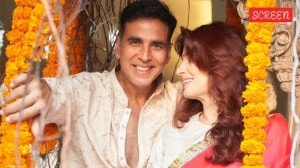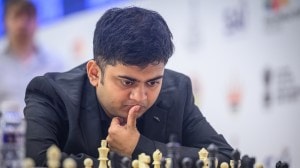Valley’s poster boys for peace
A Pensive Mufti Mohammed Sayeed stares at you from a pretty chinar as you climb up the narrow road lined with white liliums and an occasiona...

A Pensive Mufti Mohammed Sayeed stares at you from a pretty chinar as you climb up the narrow road lined with white liliums and an occasional BSF post. It’s one of the first posters of any political party you encounter just a few kilometres off the National Highway to Baramulla.
There is another one as you turn into the historic Thada Sahib gurdwara outside Singhpura, the biggest village of the Sikhs in the Valley, also called the Kerala of Kashmir due to its high literacy rate. But this one is torn with Mufti hanging quite forlornly from a thick poplar stem. It’s an omen, for the People’s Democratic Party (PDP) does not command any fan following in this village which hasn’t been singed by militancy in the last 14 years. The posters spell peace in this border district still considered the hotbed of militancy.
Subedar Aya Singh Dardi (retd), one of the village elders, fumes as he tells you how not a single representative of the PDP Government has cared to visit this prosperous village. This is an affront considering the visits it was paid by former National Conference chief Minister Farooq Abdullah when he was in power.
Dapper in a blue coat, Mohammed Maqbool, a local teacher, gives another reason for this annoyance. ‘‘The PDP has given no representation to the minorities, how can we take it seriously?’’ You see, this village where the Sikhs and Muslims enjoy an equal number takes its secular character very seriously. It dates back to the days of Maharaja Ranjit Singh, who is said to have established this village during his forays into the Valley. Since then, it’s enjoyed unbroken peace but for the bloody invasion by Pakistani raiders in 1947, which claimed 65 lives.
‘‘Even then, the locals never harmed us,’’ says the portly Capt Onkar Singh (retd). This tradition was maintained even when the turmoil started. ‘‘We used to hold weekly interactions to sort out matters, we didn’t let militancy hijack our children,’’ says Rafiq Rather, a government employee. ‘‘We didn’t let anyone leave, we said jo bhi hoga dono ko hoga,’’ says Maqbool.
Besides, the village, which got its first primary school 100 years ago, and now boasts two higher secondary schools, was always committed to education. ‘‘Here, we frown on simple graduates,’’ says Dardi, who fought the Lok Sabha elections on an Akali Dal ticket in 1971. It shows as he reels out the names of the who’s who of the village. It includes one serving IAS officer, a retired DIG, doctors, army officers, a legion of teachers and government employees. This, even though the villagers are at pains to tell you that agriculture is the main occupation of the 158-odd families here, and that their apples are the very best.
One title that it’s slowly catching on is that of a sports village comparable to Sansarpur of Punjab, renowned for producing hockey Olympians. This village may not have produced any Olympians as yet, but its young men make up for half the hockey team of Jammu and Kashmir police. One of the local boys Gurjeet Singh, who is in the police, even represented India in Moscow last year. The sporting spirit is thanks partly to the sprawling playground of the Govt High Secondary School for Boys in the village. ‘‘Spread over 60 kanals, it’s one of the biggest in the Valley,’’ says Rajinder Kaur, the principal Come July, and the village holds a big rural sports mela.
Their annual Baisakhi mela held on April 15 is also a big draw, thanks to the historic Thada Sahib gurdwara built in the memory of the Sixth Sikh guru who is said to have visited the village. The militants may have steered clear of the village, but the BSP and Army have not.
The BSF came long before militancy in 1971 to set up its headquarters here. The Army trooped in around 10 years ago. ‘‘They have occupied around 1,751 kanals of our land, but we are yet to get a single paisa from them,’’ says Dardi, who’s pursuing the case on behalf of the village. The OG, much beloved in the years after Partition, now rankles. Try suggesting that perhaps they’ve remained militancy-free because of the heavy Army presence, and you hear a collective snort. ‘‘We don’t need them,’’ says Harbans Singh, a trucker and Abdul Majed Shah, a shopkeeper. What they do need is peace in the Valley, for they’ve suffered painful collateral damage.
Dardi’s son, Jatinder Singh—a constable in the police died in a mine blast in 1995, Jeet Singh’s 14-year-old son was killed in cross-firing in his school, while Rehman Lone had to pay with his life when he attended an election rally in 1996.
There are other worries: the boys’ school building is on the brink of collapse, and the jobs too are on the wane. They don’t think the LS polls would make any difference to the J-K issue. But yes, they do have faith in Prime Minister A B Vajpayee. ‘‘He could make a difference,’’ murmurs Mohd Maqbool. Which is why they just might vote.



- 01
- 02
- 03
- 04
- 05




























